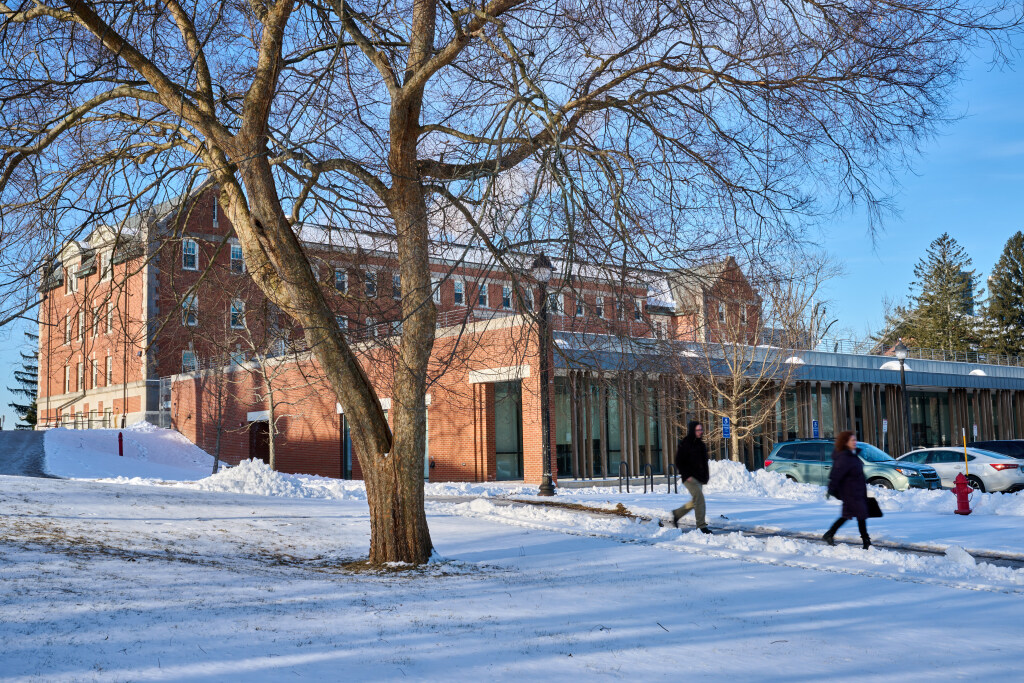Near the end of three years of rigorous study, UConn Law student Louanne Cooley was looking forward to finishing her final semester and graduating. The Covid-19 pandemic upended everything, and suddenly the future felt far less certain.
“Some bar exams are postponed, and who knows what it will all mean for future jobs,” Cooley said. But her goals remain the same. “The best advice I’ve gotten is to just do the next right thing,” she said from her home, where she has been studying and attending online classes since March 23. That day, her “next right thing” was to finish a paper for her Legal Profession class.
The Covid-19 pandemic forced the UConn School of Law to move operations off campus after the spring break. Classes shifted online and students, faculty and most of the staff dispersed to work from home, leaving a small facilities crew to maintain the buildings and grounds.
The adjustments have been challenging. Some law students, like Cooley, have children or other family members in their care. Others have full-time jobs. Some face financial instability, feelings of isolation and emotional hardship.
Jennifer Cerny, assistant dean of students, said she has been proud of the way students have responded to the crisis. Many have asked how they can help other students who are struggling.
“Our entire community is experiencing the effects of collective trauma and stress, and that impacts learning and engagement,” Cerny said. “But the acts of kindness and generosity I’ve seen are evidence that our students will make it through this experience as legal professionals with pretty remarkable advocacy skills.”
Even for those students who have found the disruption relatively manageable, changing circumstances have required changes in strategy.
For Amy Saji a second-year student who was accustomed to studying in the library, home is not offering many options. “What I’m trying to do is find a new spot in my house to study in so I can constantly change it up,” she said.
Jillian Chambers, also in her second year, discovered that working from home doubled her caffeine intake – and scalded her tongue.
“I went from commuting 120 miles a day, five to six days a week, to only commuting from my bed to the couch and from the couch to the kitchen,” she said. “I used to fill up my travel mug before my commute, so it’s been a learning experience for me in trying not to burn my tongue when the coffee is fresh out of the pot.”
Faculty members face their own set of challenges, which includes learning how to teach classes virtually.
After a training session for faculty that was quickly put together by the law school’s Information Technology Services department, Associate Dean Paul Chill brought his Legal Profession class onto the Webex video conferencing platform.
“The virtual teaching software works pretty well,” Chill said. “That said, it’s hard not being in the same room as students and being able to read their mood.”
Chill has other concerns. His wife, Lauren Cohn, a pulmonologist in the intensive care unit at Yale New Haven Hospital, is on the front lines of fighting the pandemic. “She’s stressed and exhausted and I’m doing my best to take care of the household so it’s something she doesn’t have to worry about,” Chill said.
Professor Valeria Gomez said she craves routine and normalcy in her workdays. While almost everything in her life has changed, she still starts every day by sipping coffee, listening to The Daily podcast and thinking about the busy day ahead. Even though the law school campus is closed, her clients in the Asylum and Humans Rights Clinic still require significant legal help. Gomez and her partner have developed a system where she puts a warning sign on their shared home-office door when speaking about confidential client matters.
Justin Rogowski, a staff member in the UConn Law Library, said he has struggled to adapt to working in the same physical space where he relaxes. As someone who already spent a lot of time on his personal computer, he said it has been difficult to emotionally differentiate work hours from down hours. Then, his colleague suggested he introduce a new routine into his day.
“Immediately after work, I leave the house and go for a walk, or a quick drive if it’s raining,” Rogowski said. “That separation and physical act of re-entering the house helps a ton.”
Follow UConn Law students, staff and faculty as they adjust to working at home, on Instagram @uconnlaw and Facebook /uconnlawschool #WFHUConnLaw


